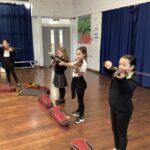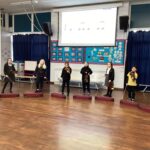Intent
Music develops imagination, sensitivity, inventiveness, community, enjoyment and a sense of achievement. It fosters the development of the whole child rather than simply teaching about music. In our school, music brings communities together through the shared endeavour of whole-school singing, experimenting with the creative process of music making and, through the love of listening to friends and fellow pupils, performing. Experiencing and playing music together is a core aspect of learning a musical instrument and can bring life changing opportunities, create a sense of achievement and lifelong memories for all involved. Through music we want pupils to unite with each other to increase wellbeing, self-confidence .
Implementation
With singing at its centre, our music curriculum is built on the premise that every child has a voice. Our music curriculum is based on the Charanga scheme of work and Sing up. These are used to plan and deliver 60 minutes of music instruction a week through in class lessons and singing assemblies. We work with Herts Music Service to enhance the opportunities for music through small group violin instruction.
Pupils follow a pattern of study based that is progressive and immersive. This is centred around a particular style of music that begins with listen and respond activities, followed by vocals and culminates in using tuned instruments to learn the melody. Elements of composing, performing, and listening, build musical techniques as well as self-confidence, memory, wellbeing, motor skills, analytical, communication and performance skills.
We ensure that:
- Pupils use their voices expressively and creatively through singing.
- Pupils develop an appreciation for a range of music genres and styles.
- Pupils perform, listen to, review and evaluate music across a range of historical periods, genres, styles and traditions.
- Pupils play tuned and un-tuned instruments musically and with increasing accuracy, fluency and with expression.
- Pupils create and compose music and have the opportunity to learn a musical instrument.
- Pupils understand and explore how music is created, produced and communicated, including how technology can play a part in music composition
- Pupils develop an understanding of pitch, duration, dynamics, tempo, timbre, texture, structure and appropriate musical notations.
- Charanga Scheme Overview (337.98KB)
- Violins
- Violins


